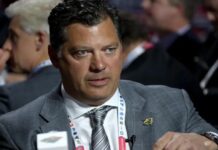The Trump administration plans to impose new sanctions against Russia on Monday to punish it for enabling the Syrian government’s use of chemical weapons in its civil war, the latest in a series of actions by both sides underscoring the deterioration in relations between Moscow and the West.
The sanctions, coming shortly after American-led airstrikes against facilities linked to Syria’s chemical weapons, are meant to signal that the United States holds responsible not just the government of President Bashar al-Assad but also his patrons in Russia and Iran. President Trump has vowed that Syria’s allies will pay a “big price” for facilitating the suspected use of poison gas.
But it remained unclear how far Mr. Trump would go in trying to shape events in Syria, which has been racked by civil war for seven years. President Emmanuel Macron of France, who along with Prime Minister Theresa May of Britain joined in the strike on Syrian targets, said on Sunday night that he had persuaded Mr. Trump to keep a small American ground force in Syria despite the president’s public declaration that he wanted to get out.
“We convinced him it was necessary to stay,” Mr. Macron said in a televised interview with French journalists. “I assure you, we have convinced him that it is necessary to stay for the long term.”
American officials, however, disputed that, saying that Mr. Macron misinterpreted the conversation. About 2,000 American troops are in Syria to fight the Islamic State, or ISIS, not to play a role in the civil war. In public comments before the chemical attack that prompted him to launch airstrikes, Mr. Trump said he wanted to pull them out right away. Advisers urged him to hold off, and he gave them five to six months to complete a withdrawal.
“The U.S. mission has not changed — the president has been clear that he wants U.S. forces to come home as quickly as possible,” Sarah Huckabee Sanders, the White House press secretary, said in a statement Sunday night. “We are determined to completely crush ISIS and create the conditions that will prevent its return. In addition, we expect our regional allies and partners to take greater responsibility both militarily and financially for securing the region.”
The new American sanctions were announced on Sunday by Nikki R. Haley, the ambassador to the United Nations and the administration’s leading public voice excoriating Russia in recent days. “They will go directly to any sort of companies that were dealing with equipment related to Assad and chemical weapons use,” she said on “Face the Nation” on CBS. “And so I think everyone is going to feel it at this point. I think everyone knows that we sent a strong message, and our hope is that they listen to it.”
Mr. Trump has tried through most of his presidency to forge a friendship with President Vladimir V. Putin of Russia and has largely avoided criticizing him personally even as a special counsel, Robert S. Mueller III, investigated whether Mr. Trump’s campaign coordinated with Russia during the 2016 election. But in recent weeks, his administration has taken increasing action against Russia, and the president singled out Mr. Putin over Syria’s use of chemical weapons on Twitter and again in a televised speech on Friday night.


















